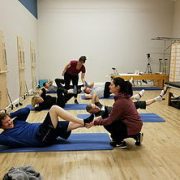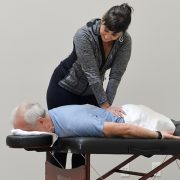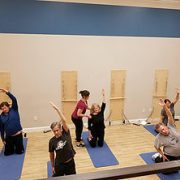Tips and Solutions for Morning Back Pain
Tips and Solutions for Morning Back Pain: Causes and How to Fix it
One of the most common complaints from people suffering from chronic back pain is how stiff and sore their back feels first thing in the morning. For some, it seems random – almost like they’ve “thrown their back out” overnight. For others, it’s a daily struggle, waking up achy no matter how good they felt before bed.
But why does morning back pain happen? Isn’t sleep supposed to be restorative to help your body heal?
The truth is, back pain shows up differently for everyone. And while it’s easy to blame your mattress, the real causes of morning back pain could be due to other factors – like your sleeping position, lack of regular exercise, and bulging dics.
Let’s dive into each of these potential triggers and look at ways you can address them naturally:
Poor Sleeping Position
Your sleep posture can make or break how your back feels when you wake up. But what’s interesting is that the “wrong” sleeping position really depends on the root cause of your back pain. There is no one-size-fits-all. For example, some people find that lying on their back with legs elevated feels wonderful, yet for others, this position leaves them feeling stiff and sore come morning. Others experience tremendous relief sleeping on their stomach, while for some this position places a lot of strain on their spine and they wake up very stiff and achy.
Generally, the most back-friendly sleeping position is on your side. Side-sleeping makes it easier to keep your spine in a neutral, supported position, which reduces stress and tension while you sleep. It’s more challenging to find a neutral spine position when on your back or stomach. If lying on your side bothers your hips or shoulders, you can try placing a pillow under your waist and head, along with one between your thighs, to provide extra support and maintain better alignment. A pillow topper over a firm mattress makes side-sleeping a lot more comfortable as well. Small adjustments like these can significantly improve how your back feels in the morning and allow you to wake up feeling more refreshed.
Lack of Regular Exercise
A lack of regular exercise is one of the most overlooked reasons for waking up with a stiff, sore back. When you’re not moving enough during the day, your muscles (especially those supporting your spine) become weak and tight. Inactivity also reduces circulation, which means less blood flow delivering oxygen and nutrients to your muscles, joints, and discs. Without this nourishment, your tissues stiffen, and when you’re sleeping overnight, that stiffness builds. But regular movement doesn’t just strengthen muscles and nourish tissues – it keeps essential body systems like circulation, digestion, and even your nervous system running smoothly – setting the stage for more restful, regenerative sleep.
Incorporating consistent activity into your daily routine helps break this cycle. Simple exercises like walking, yoga, strength-training, and stretching encourage better blood flow throughout your body. The result? You’re less likely to experience that locked-up, achy feeling when you wake up – and you’ll likely notice deeper, better quality of sleep, too. Movement during the day primes your body to recover more efficiently overnight, reducing the likelihood of morning back pain.
Bulging Discs
This is one of the most common causes of morning back pain that I see. Your vertebral discs play a crucial role in your spine’s health by absorbing shock, holding your vertebrae together, and allowing for movement. What many people don’t realize is that your discs are made up mostly of water. Over the course of a typical day, your discs compress and lose some of that water content. But at night, while you’re lying down, they re-hydrate and can regain up to 17-25 millimeters in height.
While that might sound beneficial, it can actually be problematic if you’re dealing with an irritating, bulging disc. A bulging disc already has the potential to limit movement in your spine. But when it fills up with fluid overnight, it becomes even stiffer, leading to increased restriction and pain when you wake up.
If you’re consistently waking up feeling locked up, in significant pain, or hesitant to move – there’s a strong chance a bulging disc is contributing to your discomfort. Seeking guidance from a mechanical back pain specialist can help you get a proper diagnosis and develop a plan to manage and treat your bulging discs effectively and naturally – so you can avoid resorting to injections or procedures right away.
Don’t Always Blame your Mattress
If you’re dealing with morning back pain, hopefully this article has helped shed some light on why it’s happening. Before you go out and spend a fortune on a new mattress – consider addressing these common causes first. Take a look at your sleeping posture, evaluate whether you’re moving enough throughout the day, and rule out whether bulging discs might be part of the problem.
The good news is that 80 percent of all back pain cases can be treated naturally – and without the need for injections, procedures, or surgery. More often than not, the solution to a pain free back lies in simple, movement-based approaches that strengthen, support, and restore your body’s natural function.
Dr. Carrie Jose, Physical Therapy Specialist and Mechanical Pain expert, owns CJ Physical Therapy & Pilates in Portsmouth and writes for Seacoast Media Group. To get a free copy of her guide to back pain – click here.










